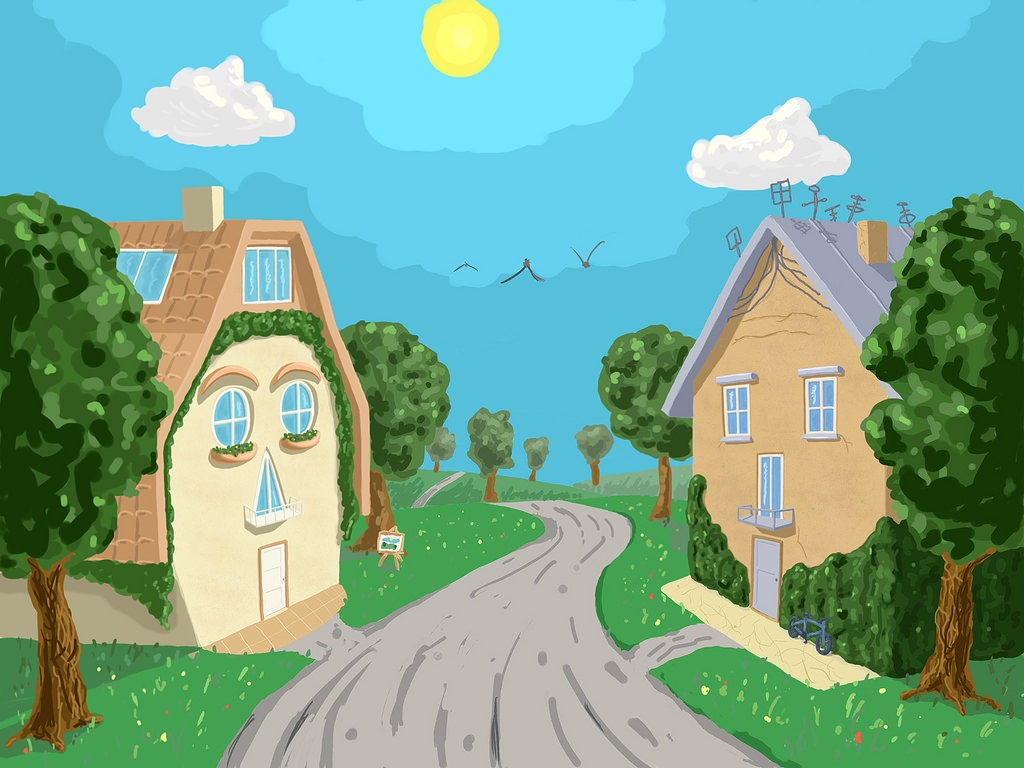
 Have you ever heard someone say that they feel like the Bible talks about two different Gods? One that is angry and vengeful, which we see in the Old Testament, and one that is merciful and loving, which we see in the New? I have heard some people try to explain this seeming difficulty by trying to say that God changes, but we can't say that because God never changes (see Malachi 3:6, Hebrews 13:8, and James 1:17)! I know that each of us only has so much time in our day, so this post will not go too deep. I'm going to try to keep it short and simple, just giving you an understanding of how we reconcile the picture of God we see in the Old and New Testaments.
Firstly, there is only one God who exists as three persons in the Trinity (God the Father, God the Son, and God the Holy Spirit). God is the same yesterday, today and forever. What has changed is our route to God. One of the reasons it is so important for Christians to read books of the Bible like Leviticus is to give us a reminder of how holy God is. He is so perfect he cannot allow sin to even approach him. He made us perfect, but left us a choice so we could have the freedom to choose to love and obey him or turn away. We chose poorly.
Have you ever heard someone say that they feel like the Bible talks about two different Gods? One that is angry and vengeful, which we see in the Old Testament, and one that is merciful and loving, which we see in the New? I have heard some people try to explain this seeming difficulty by trying to say that God changes, but we can't say that because God never changes (see Malachi 3:6, Hebrews 13:8, and James 1:17)! I know that each of us only has so much time in our day, so this post will not go too deep. I'm going to try to keep it short and simple, just giving you an understanding of how we reconcile the picture of God we see in the Old and New Testaments.
Firstly, there is only one God who exists as three persons in the Trinity (God the Father, God the Son, and God the Holy Spirit). God is the same yesterday, today and forever. What has changed is our route to God. One of the reasons it is so important for Christians to read books of the Bible like Leviticus is to give us a reminder of how holy God is. He is so perfect he cannot allow sin to even approach him. He made us perfect, but left us a choice so we could have the freedom to choose to love and obey him or turn away. We chose poorly.
Fortunately, God had a plan in motion from the moment that he created us--because he knows everything (see Isaiah 55:9, Job 28:24, 1 John 3:19-20). I don't know why he chose the plan that he did, but I do know that, coming from God, His plan is a perfect plan. After the Fall (see Genesis 3) the world quickly spun out of control; so God, seeing one righteous man (Noah) cleared the earth of the horrid things that were happening with a worldwide flood (which he promised to never do again). Then God picked a righteous man named Abram (later named Abraham) and made a covenant with him, to make him into a nation that God would personally bless. The intention was that this nation would show God's love and power to the world. Unfortunately, it became an exclusive club.
When we read of God laying out the rules to approach him we get the sense that nothing really makes us quite good enough. In fact, the whole sacrificial system (killing animals as atonement for our sins) was based around the fact that all who sin are deserving of death in God's eyes. Therefore, we see a God who, when the people he revealed himself to turn away, was (justly) a God of wrath and would often wipe out large numbers of people. At the same time, he was a God who loved his people and would listen to the prayers of these peoples' godly leaders.
Come the New Testament, where--it now being the fullness of time--"God so loved the world that he sent his only Son that whoever believes in him will not perish but have eternal life" (John 3:16). Jesus' whole mission is to die on a cross. Why? Because up until that point in time a sacrifice only atoned for past sin, which didn't work so well as people were always sinning. When Jesus (who was perfect) went to the cross God put the burden for all mankind's sin upon Jesus, making Jesus the perfect and final sacrifice for humanity's sins.
All we have to do is believe that Jesus Christ, God's Son (but also the One God), came to earth as fully man and fully God, bore our sins on the cross (because God loves us and wants us to be saved), died, descended to hell and took the keys of life and death from Satan's grasp, rose again three days later, and now lives in heaven again. If you believe that and in the fact that belief in Jesus is the only way to spend eternity with God in heaven, you're saved!
Now, back to our reconciliation of just and wrathful God vs merciful and loving God. They are one in the same and have never changed. God is still just. People that do or think bad things (in other words, sin)--as we all do--justly deserve death for working against their perfect Creator: God. God is justly wrathful at what they have done. God has also always been merciful (saving Lot from Sodom is an Old Testament example) and loving (he desires to be with his children). But now, because of Jesus, those of us who are Christians are now covered over by Christ's blood and our sins are no more. God looks at us and sees his son's perfection. He could justly send us to live an eternity in hell, but his Son paid that price for us. So now, even though we mess up, we're forgiven because we are standing in the identity of Christ.
However, we still live in a fallen world--that doesn't get fixed until all the events in the book of Revelation have taken place. Therefore, the question of "why does a loving God allow..." can be summed up with God being just and the fact that God created a perfect world and handed us its future--which we decided would include imperfection when we sinned in the Garden of Eden. So now we (justly) have what we have until God institutes the New Heaven and New Earth. And I'm looking forward to that day.
In conclusion, we can see that there is no reconciliation of the God we see in the Old and New Testaments. He has never changed, but Jesus' sacrifice for us has changed our approach to him.
We would love to hear from you. Leave your comments below or on our Facebook page!
--Pastor Stephen Valcourt 







 Everyone has an opinion about everything that is wrong in the world, but few will do anything about it. That is how it seems at times. In my experience speaking with people in our own community, I have found it does not take long before someone begins to lament the problems facing Pincher Creek. Low voter turn-outs, a lack of volunteers and community engagement, at-risk youth, thinly veiled racism, drug and alcohol abuse, loneliness, a lack of services and shut-in seniors with no one to visit them: these are just a few of the problems that communities like ours are facing. We know these problems exist—even if we choose to ignore them—but how can we address them?
Everyone has an opinion about everything that is wrong in the world, but few will do anything about it. That is how it seems at times. In my experience speaking with people in our own community, I have found it does not take long before someone begins to lament the problems facing Pincher Creek. Low voter turn-outs, a lack of volunteers and community engagement, at-risk youth, thinly veiled racism, drug and alcohol abuse, loneliness, a lack of services and shut-in seniors with no one to visit them: these are just a few of the problems that communities like ours are facing. We know these problems exist—even if we choose to ignore them—but how can we address them?
 Have you ever heard someone say that they feel like the Bible talks about two different Gods? One that is angry and vengeful, which we see in the Old Testament, and one that is merciful and loving, which we see in the New? I have heard some people try to explain this seeming difficulty by trying to say that God changes, but we can't say that because God never changes (see Malachi 3:6, Hebrews 13:8, and James 1:17)! I know that each of us only has so much time in our day, so this post will not go too deep. I'm going to try to keep it short and simple, just giving you an understanding of how we reconcile the picture of God we see in the Old and New Testaments.
Firstly, there is only one God who exists as three persons in the Trinity (God the Father, God the Son, and God the Holy Spirit). God is the same yesterday, today and forever. What has changed is our route to God. One of the reasons it is so important for Christians to read books of the Bible like Leviticus is to give us a reminder of how holy God is. He is so perfect he cannot allow sin to even approach him. He made us perfect, but left us a choice so we could have the freedom to choose to love and obey him or turn away. We chose poorly.
Have you ever heard someone say that they feel like the Bible talks about two different Gods? One that is angry and vengeful, which we see in the Old Testament, and one that is merciful and loving, which we see in the New? I have heard some people try to explain this seeming difficulty by trying to say that God changes, but we can't say that because God never changes (see Malachi 3:6, Hebrews 13:8, and James 1:17)! I know that each of us only has so much time in our day, so this post will not go too deep. I'm going to try to keep it short and simple, just giving you an understanding of how we reconcile the picture of God we see in the Old and New Testaments.
Firstly, there is only one God who exists as three persons in the Trinity (God the Father, God the Son, and God the Holy Spirit). God is the same yesterday, today and forever. What has changed is our route to God. One of the reasons it is so important for Christians to read books of the Bible like Leviticus is to give us a reminder of how holy God is. He is so perfect he cannot allow sin to even approach him. He made us perfect, but left us a choice so we could have the freedom to choose to love and obey him or turn away. We chose poorly.